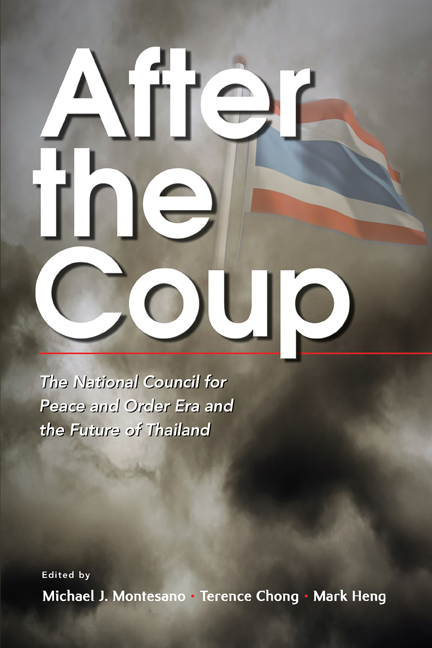Book contents
- Frontmatter
- Contents
- About the Contributors
- 1 Introduction: Thai Realities and Possibilities after the 22 May Coup
- 2 The Rise of the Thai Upper Middle Class and its Turn against Democracy
- 3 “We the Southerners Come to Protect the Nation and the King”: Southerners’ Political Rise and Regional Nationalism in Thailand
- 4 Exit, Voice, (Dis)loyalty? Northeast Thailand after the 2014 Coup
- 5 The Red Shirts and their Democratic Struggle in Northern Thailand, April 2010 – May 2015
- 6 The Shifting Battleground: Peace Dialogue in Thailand's Malay-Muslim South
- 7 Thailand's Zigzag Road to Democracy: Continuity and Change in Military Intervention
- 8 Murder and Regress: Violence and Political Change in Thailand
- 9 Thailand's Politics of Decentralization: Reform and Resistance before and after the May 2014 Coup
- 10 Change and Continuity in the Politics of the Media after the Coup
- 11 Thailand's Royal Democracy in Crisis
- 12 The Foreign Press and its Changing Perceptions of the Thai Monarchy
- 13 Thai Economic Growth: Retrospect and Prospect
- 14 Features and Challenges of an Ageing Population in Thailand
- 15 Conclusion: Thailand in Transition
- Bibliography
- Index
9 - Thailand's Politics of Decentralization: Reform and Resistance before and after the May 2014 Coup
Published online by Cambridge University Press: 23 May 2019
- Frontmatter
- Contents
- About the Contributors
- 1 Introduction: Thai Realities and Possibilities after the 22 May Coup
- 2 The Rise of the Thai Upper Middle Class and its Turn against Democracy
- 3 “We the Southerners Come to Protect the Nation and the King”: Southerners’ Political Rise and Regional Nationalism in Thailand
- 4 Exit, Voice, (Dis)loyalty? Northeast Thailand after the 2014 Coup
- 5 The Red Shirts and their Democratic Struggle in Northern Thailand, April 2010 – May 2015
- 6 The Shifting Battleground: Peace Dialogue in Thailand's Malay-Muslim South
- 7 Thailand's Zigzag Road to Democracy: Continuity and Change in Military Intervention
- 8 Murder and Regress: Violence and Political Change in Thailand
- 9 Thailand's Politics of Decentralization: Reform and Resistance before and after the May 2014 Coup
- 10 Change and Continuity in the Politics of the Media after the Coup
- 11 Thailand's Royal Democracy in Crisis
- 12 The Foreign Press and its Changing Perceptions of the Thai Monarchy
- 13 Thai Economic Growth: Retrospect and Prospect
- 14 Features and Challenges of an Ageing Population in Thailand
- 15 Conclusion: Thailand in Transition
- Bibliography
- Index
Summary
To determine whether political transformation causes radical and long-lasting change requires attention to the question of whether that transformation has changed the regime or the state (Petras 1989, pp. 26–27). At the regime level, change occurs in government, parliament, electoral rules, political parties and degrees of civic participation. Changes at the regime level often occur as a result of the reform of political institutions, from which a new regime emerges. For instance, when the administrative structure is reformed, state-society relations are re-regulated or the electoral system is changed, regime change is or may be the result. In the context of international interest in democratizing reforms, many states have introduced institutional designs meant to promote democracy. Political change at the state level, while more powerful and consequential, has proved less likely to occur. Petras (1989, p. 26) emphasizes the state's embodiment of “the permanent institution of government and the concomitant ensemble of class relations which have been embedded in these same institutions”. It follows that to determine whether political change has the potential to consolidate democracy demands consideration of change at the level of the state.
Decentralization ranks among the most important reforms of a state's political institutions. It entails administrative restructuring that aims to establish efficient, participatory and democratic self-government. According to Sharpe, three principles underpin democratic local governance: liberty, participation and efficient service (Sharpe 1970, p. 156). Any local administration that upholds these values would approach the ideal of local democracy, which is a foundation for a developing democratic regime.
This chapter examines the effects that regime decentralization can have on the characteristics of the state, including those not anticipated by the elites that have supported decentralization. It elaborates on characteristics of the Thai state and, in particular, on interactions between the state and local political actors in rural and provincial areas. Its focus is on political power relations outside Bangkok. The chapter assesses the way in which three basic attributes of the state — a centralized and powerful bureaucracy, deep-rooted clientelism and what I term “hegemonic ideology” — informed decentralization. In turn, these attributes engendered resistance to the process of decentralization itself. That resistance dated from the beginning of the decentralization movement. However, the trend of democratization at the time meant that it took concealed forms.
- Type
- Chapter
- Information
- After the CoupThe National Council for Peace and Order Era and the Future of Thailand, pp. 224 - 253Publisher: ISEAS–Yusof Ishak InstitutePrint publication year: 2019



